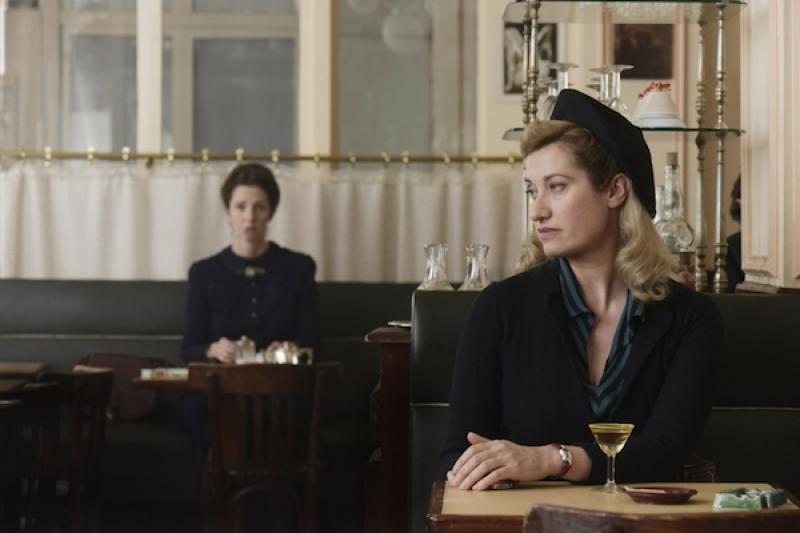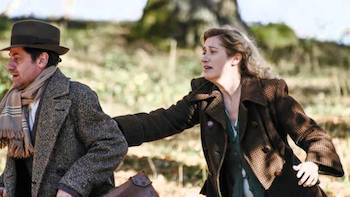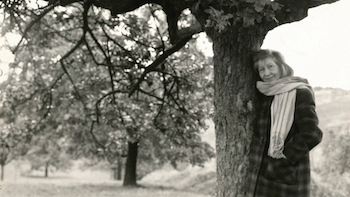Violette | reviews, news & interviews
Violette
Violette
Searing biopic of a taboo-breaking French novelist who sought love in the wrong places

Mesmerising in her sustained emotional rawness, Emmanuelle Devos is at her empathetic best in Violette, a psychological study of a woman damned by her loveless childhood and what she perceived as her ugliness.
Devos gave an impression of homeliness and dowdiness as the near-deaf secretary ridiculed by her colleagues in Jacques Audiard's Read My Lips, but in that 2001 film, as in Martin Provost's Violette Leduc biopic, she obliterated conventional value judgments about women's appearances. She has a habit, too, of rendering almost appealing negative qualities like neediness, self-consciousness, and self-pity. The more her Violette twitches and mopes, the more her mouth sags, the more one wants to hug her.
It helps, of course, that the movie shows how Leduc (1907-72), unrequitedly in love with her mentor Simone de Beauvoir, supposedly liberated herself through her ability to transmit the full range of her experiences – from the erotically transporting to the mentally crushing, from the momentary to the lifelong – into disarmingly sensuous prose in such novels as In the Prison of Her Skin (1946) and Ravages (1955). As Violette builds to Leduc achieving late success with her memoir The Bastard (1964), it more skillfully than most writer biopics translates the flow of thoughts – some visually prompted by flashbacks wherein the past and the present converge, Dennis Potter-style – into the act of creation.
Consequently, it's never tedious watching Leduc write, though her finding inspiration during a solitary, sunny Provençal idyll borders, forgivably, on the bathetic. Most of the film's unnecessarily titled chapters are steeped in a melancholy murk.
 This particularly suits the opening wartime sequence, which introduces Leduc as a black marketeer living in the country with her ill-fated Jewish writer friend Maurice Sachs (Olivier Py, pictured with Devos), and another in postwar Paris where (minus husband Gabriel) she drinks in pleasingly smoky dives with Jean Genet (Jacques Bonnaffé). The pair also make weekend movies with the wealthy perfumer and literary patron Jacques Guérin (Olivier Gourmet) at his country estate. The script by Provost, Marc Abdelnour, and René de Ceccatty avoids Leduc's obsession with Genet but not her sexual pursuit of Sachs and Guérin, who, like the author of The Maids, were gay. Even the builder with whom Leduc later has an affair encourages her to sleep with his brother instead. Loving the emotionally unavailable was her theme.
This particularly suits the opening wartime sequence, which introduces Leduc as a black marketeer living in the country with her ill-fated Jewish writer friend Maurice Sachs (Olivier Py, pictured with Devos), and another in postwar Paris where (minus husband Gabriel) she drinks in pleasingly smoky dives with Jean Genet (Jacques Bonnaffé). The pair also make weekend movies with the wealthy perfumer and literary patron Jacques Guérin (Olivier Gourmet) at his country estate. The script by Provost, Marc Abdelnour, and René de Ceccatty avoids Leduc's obsession with Genet but not her sexual pursuit of Sachs and Guérin, who, like the author of The Maids, were gay. Even the builder with whom Leduc later has an affair encourages her to sleep with his brother instead. Loving the emotionally unavailable was her theme.
As Leduc careers through mid-life, the one constant is de Beauvoir, played with ambiguous aloofness by the excellent Sandrine Kilberlain. She secretly gives her cash-strapped protégée 25,000 fr. monthly (passing it off a stipend from their publisher) and sternly insists Leduc channel her feelings of worthlessness into her writing. As she seems to recognize in a moment of silent reflection, however, de Beauvoir has unwittingly become part of Leduc's problem, her lack of romantic interest in her reinforcing, unconsciously at least, the latter's unresolved grief over her father's abandonment and her mother's refusal to give her affection. Ignorant of her offence, Berthe Leduc (Catherine Hiegel) mellows as she ages and reaches out to Violette after she suffers a breakdown – even tending her physically – but it's too little too late.
 De Beauvoir was portrayed in the minimally exported French television film Les amants du Flore (2006). It focused, inevitably, on her relationship with Jean-Paul Sartre, who is mentioned in Violette as a Leduc fan but remains unseen, mercifully so given his bloated iconic masculinity. His imprimatur cuts little ice here.
De Beauvoir was portrayed in the minimally exported French television film Les amants du Flore (2006). It focused, inevitably, on her relationship with Jean-Paul Sartre, who is mentioned in Violette as a Leduc fan but remains unseen, mercifully so given his bloated iconic masculinity. His imprimatur cuts little ice here.
That Leduc (pictured above) has become the subject of a major biopic before her celebrated champion is not quite ironic. Her struggle – as an unwanted daughter, as an adolescent who first explored passion in a girls' dorm, as a woman devastated by an early abortion, as a writer censored for parsing female sexuality in her fiction, as, in her own words, "a crazy, neurotic, washed-up old bag" tormented by loneliness – embodied the cultural imbalance de Beauvoir delineated in The Second Sex. Leduc thus emerges, in this film at least, as the heroine of feminist existentialism's seminal work – whose bleeding heart was staunched occasionally by her will to lay it bare, in print, for a grateful audience.
more Film
 Stephen review - a breathtakingly good first feature by a multi-media artist
Melanie Manchot's debut is strikingly intelligent and compelling
Stephen review - a breathtakingly good first feature by a multi-media artist
Melanie Manchot's debut is strikingly intelligent and compelling
 DVD/Blu-Ray: Priscilla
The disc extras smartly contextualise Sofia Coppola's eighth feature
DVD/Blu-Ray: Priscilla
The disc extras smartly contextualise Sofia Coppola's eighth feature
 Fantastic Machine review - photography's story from one camera to 45 billion
Love it or hate it, the photographic image has ensnared us all
Fantastic Machine review - photography's story from one camera to 45 billion
Love it or hate it, the photographic image has ensnared us all
 All You Need Is Death review - a future folk horror classic
Irish folkies seek a cursed ancient song in Paul Duane's impressive fiction debut
All You Need Is Death review - a future folk horror classic
Irish folkies seek a cursed ancient song in Paul Duane's impressive fiction debut
 If Only I Could Hibernate review - kids in grinding poverty in Ulaanbaatar
Mongolian director Zoljargal Purevdash's compelling debut
If Only I Could Hibernate review - kids in grinding poverty in Ulaanbaatar
Mongolian director Zoljargal Purevdash's compelling debut
 The Book of Clarence review - larky jaunt through biblical epic territory
LaKeith Stanfield is impressively watchable as the Messiah's near-neighbour
The Book of Clarence review - larky jaunt through biblical epic territory
LaKeith Stanfield is impressively watchable as the Messiah's near-neighbour
 Back to Black review - rock biopic with a loving but soft touch
Marisa Abela evokes the genius of Amy Winehouse, with a few warts minimised
Back to Black review - rock biopic with a loving but soft touch
Marisa Abela evokes the genius of Amy Winehouse, with a few warts minimised
 Civil War review - God help America
A horrifying State of the Union address from Alex Garland
Civil War review - God help America
A horrifying State of the Union address from Alex Garland
 The Teachers' Lounge - teacher-pupil relationships under the microscope
Thoughtful, painful meditation on status, crime, and power
The Teachers' Lounge - teacher-pupil relationships under the microscope
Thoughtful, painful meditation on status, crime, and power
 Blu-ray: Happy End (Šťastný konec)
Technically brilliant black comedy hasn't aged well
Blu-ray: Happy End (Šťastný konec)
Technically brilliant black comedy hasn't aged well
 Evil Does Not Exist review - Ryusuke Hamaguchi's nuanced follow-up to 'Drive My Car'
A parable about the perils of eco-tourism with a violent twist
Evil Does Not Exist review - Ryusuke Hamaguchi's nuanced follow-up to 'Drive My Car'
A parable about the perils of eco-tourism with a violent twist
 Io Capitano review - gripping odyssey from Senegal to Italy
Matteo Garrone's Oscar-nominated drama of two teenage boys pursuing their dream
Io Capitano review - gripping odyssey from Senegal to Italy
Matteo Garrone's Oscar-nominated drama of two teenage boys pursuing their dream

Add comment